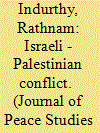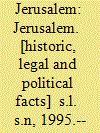|
|
|
Sort Order |
|
|
|
Items / Page
|
|
|
|
|
|
|
| Srl | Item |
| 1 |
ID:
105454


|
|
|
|
|
| Publication |
2011.
|
| Summary/Abstract |
Divided cities within contested states are a category in their own right, in that their division is driven by issues of national sovereignty as well as ethnic, religious and linguistic cleavages. Reconstituting them as integrated urban spaces, therefore, requires policy shifts on many levels-local, municipal and state-but too often these are hampered by fears of loss of sovereignty and external domination. The case of Jerusalem in the Palestinian-Israeli conflict is a prime example of how national sovereignty issues can be seen as having an impact upon urban divisions. One option that is proposed for the resolution of this conflict, which has generated intense debate on both sides, is that of a binational Israeli-Palestinian state. This article argues that there is a false dichotomy concerning the competing benefits of binational and two-state models in the Palestinian-Israeli conflict. It contends, on the one hand, that the binational model comprises many forms, some of which are more confederal in structure. On the other hand, for the two state model to function effectively a high degree of interstate coordination is required which brings it close to some forms of confederalism. The article examines the discussions on divided Jerusalem to explore this argument and highlights the degree of interstate coordination that is required if any of the plans being put forward for the future of the city are to work. It concludes by relating the Jerusalem example to the wider issue of divided cities in contested states.
|
|
|
|
|
|
|
|
|
|
|
|
|
|
|
|
| 2 |
ID:
096964


|
|
|
|
|
| Publication |
2010.
|
| Summary/Abstract |
This paper explores the role of academic scholarship and practice in constituting, aggravating, and resolving the Israeli-Palestinian conflict. The first section of the paper examines how scholarly discourse and methods of analysis contribute to shaping (mis)understandings of on-the-ground conflict dynamics. To demonstrate this point, the paper first overviews conventional social science methods used in mainstream international relations (IR) scholarship that tend to reify, freeze and homogenize 'the conflict' as well as conflict parties and then uses a different scholarly approach-namely a processual, peace-studies-oriented methodology-that provides a very different 'picture' of the conflict, its parties and appropriate strategies of engagement in the pursuit of peace. The second section of the paper uses three brief case studies to demonstrate how Israeli and Palestinian academics help constitute 'the conflict' and its parties not only through their scholarship but also through their 'practice'. These examples also show the importance of re-evaluating analytical models to include contextual dynamics such as time, place and sources of available power as well as to recognize the diversity of Palestinian and Israeli views regarding the sources of-and best approaches for addressing-'the conflict'.
|
|
|
|
|
|
|
|
|
|
|
|
|
|
|
|
| 3 |
ID:
102012


|
|
|
|
|
| Publication |
2011.
|
| Summary/Abstract |
This article explores the use of non-territorial state structures as a two-state solution to the Israeli-Palestinian conflict. By presenting a nation-state that exists over certain people, and not exclusive territory, this article offers a method for Israelis and Palestinians to each have the self-determination of an independent government while being able to mutually exist over disputed land. While the territorial state structure was designed in the 17th century, this new system may better fit modern conditions.
|
|
|
|
|
|
|
|
|
|
|
|
|
|
|
|
| 4 |
ID:
094150


|
|
|
| 5 |
ID:
005927


|
|
|
|
|
| Publication |
No imprint, s.n, 1995.
|
| Description |
88p.pbk
|
|
|
|
|
|
|
|
|
|
|
|
Copies: C:1/I:0,R:0,Q:0
Circulation
| Accession# | Call# | Current Location | Status | Policy | Location |
| 036989 | 956.9442/JER 036989 | Main | On Shelf | General | |
|
|
|
|
| 6 |
ID:
102014


|
|
|
|
|
| Publication |
2011.
|
| Summary/Abstract |
As the Israeli-Palestinian peace process continues to stalemate, voices calling for an inclusive single state in Israel/Palestine as an alternative to the two-state solution have grown louder. This article reviews the Palestinian debate around the one-state solution and analyzes the challenges its advocates face in generating political support, central among which is the difficulty of redefining the Palestinian cause in terms of a struggle for equal political rights within a single polity rather than in terms of a struggle for a separate state.
|
|
|
|
|
|
|
|
|
|
|
|
|
|
|
|
| 7 |
ID:
096790


|
|
|
|
|
| Publication |
Istanbul, Foundation for Human Rights and Freedoms and Humanitarian Relief, 2010.
|
| Description |
40p.
|
|
|
|
|
|
|
|
|
|
|
|
Copies: C:1/I:0,R:0,Q:0
Circulation
| Accession# | Call# | Current Location | Status | Policy | Location |
| 055001 | 303.609569/INS 055001 | Main | On Shelf | General | |
|
|
|
|
| 8 |
ID:
096115


|
|
|
|
|
| Publication |
2010.
|
| Summary/Abstract |
Previous work on the dynamics of conflicts where we see terrorism has tended to focus on whether we see shifts in attack mode following government countermeasures. We contend that many factors other than counterinsurgency can influence whether groups resort to terrorism, including competition between groups, as well as their relationship to public opinion and other political events. Hence, understanding terrorist tactics in prolonged conflicts with multiple actors requires us to consider a more general framework of innovation, imitation, competition and dependence between actors. We use disaggregated data on terrorist attacks, counterterrorism and public opinion in the Israel-Palestine conflict to jointly evaluate predictions derived from several conventional theories of strategic behaviour. We find that the strategic calculus of Palestinian groups is complex and cannot be treated as time invariant. Our results suggest that factors such as the degree of public support, inter-group competition, the anticipation of countermeasures and non-trivial non-violent payoffs have an observable effect on the strategic behaviour of the Palestinian groups, and that structural relationships are often far from constant over time.
|
|
|
|
|
|
|
|
|
|
|
|
|
|
|
|
|
|
|
|
|